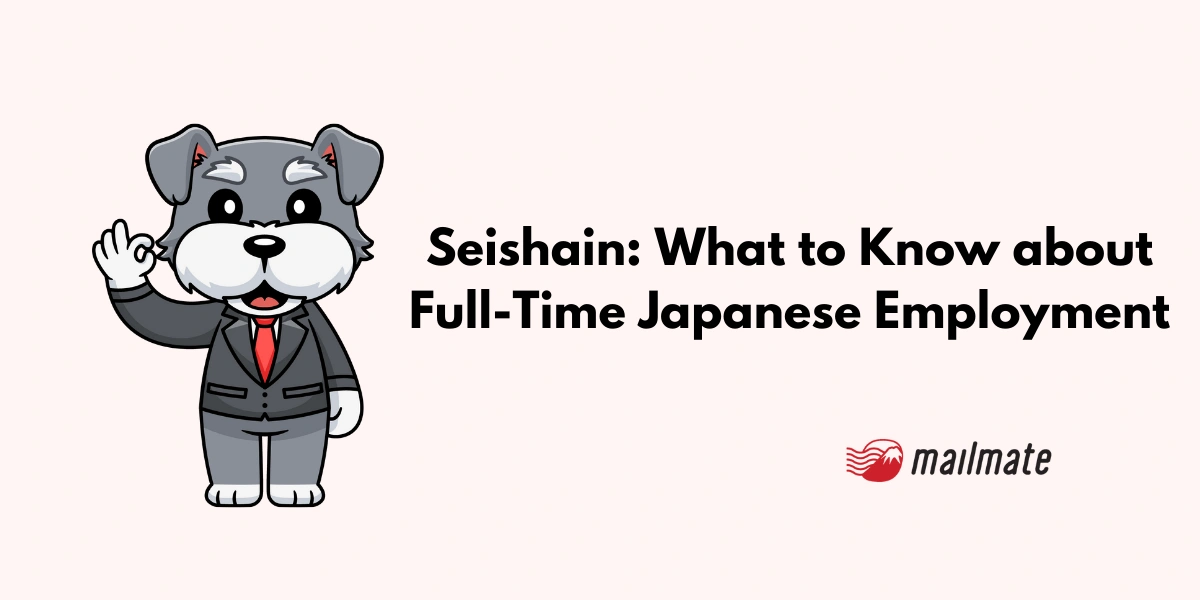Seishain: What to Know about Full-Time Japanese Employment

Working in Japan is a dream opportunity for many. However, the type of employment can greatly affect your life in Japan.
As a foreigner, looking for a job is one thing, but being familiar with Japanese employment contracts is even more important.
Looking for "seishain" employment is important for full-time employment in Japan.
So let's look at what seishain means.
Seishain (正社員): Permanent employee in Japan

A seishain (正社員) refers to a permanent, full-time employee in Japan that includes benefits and job security compared to other types of employment.
Seishain regular employees can participate in company-sponsored training programs and career development opportunities, leading to promotions and salary increases based on seniority and performance.
Additionally, having seishain employment offers dismissal protection, insurance benefits, lower pension and insurance contributions, annual paid leave, sick leave, and covered commuting costs.
Benefits of seishain
When you are a full-time employee in Japan, you are entitled to employee benefits and social security:
Pension: you pay 50% of the pension insurance premium, and your employer will cover the rest
Health Insurance and Nursing Care: 70% of all medical costs are covered by health insurance, and thus, you only pay 30%. It also includes dental, hospitalization, prescribed medicine, and childbirth.
Accident insurance: you are covered under accident insurance for all work-related accidents, illnesses, and disabilities.
Unemployment insurance: covered under unemployment insurance and eligible to receive 50 to 80% of your salary if you lose your job.
Additionally, seishain employee benefits include extra paid holidays, sick leave, bonuses, and salary increases. However, that depends on the Japanese company.
Drawbacks of seishain
While a Japanese seishain contract has many benefits, it can restrict your work-life balance. Many seishain work overtime to complete their tasks before deadlines.
Other types of employment contracts
If you are looking for a job in Japan, you should know these three other Japanese employment types.
Keiyaku shain (契約社員): Contract employee
Keiyaku shain (契約社員) in Japan are contract-based employees, also known as contract employees. As a contract worker, employment involves regular work, but the employment is only for a limited time.
A contract position as a keiyaku shain is often used to build trust with the company before potentially transitioning to a seishain role.
Keiyaku shain positions usually have few benefits and reduced job security.
Haken shain (派遣社員): Dispatch employee
Haken shain (派遣社員) are dispatch or temporary employees, often referred to as temp workers. They are usually employed by a dispatch agency and assigned to client companies temporarily through a haken contract.
Client companies can hire haken shain to adjust their workflow based on business needs without committing to long-term contracts.
As a haken shain, you have more flexibility and the opportunity to work in various industries and roles, but with limited benefits and less job security than seishain.
Gyoumu-Itaku (業務委託): Self-employed

Gyoumu itaku (業務委託) in Japan are hired individuals who are independent contractors or freelancers rather than traditional employees.
Those on a gyoumu itaku employment contract are not considered employees under Japanese labor laws, meaning they can not receive health insurance, pension contributions, or paid leave.
Instead, you will need to apply for the National Pension (国民年金の手続き) and National Health Insurance (国民健康保険の手続き).
Plus, gyoumu itaku workers have complete control over their work hours and methods, allowing them to be more flexible and control their projects and workloads.
Frequently asked questions
What is a seishain?
Seishain in Japanese refers to a full-time employee of a company in Japan.
What are the different types of employees in Japan?
Japanese employment can be categorized into three types: seishain (permanent employee), keiyaku shain (contract employee), and haken sha-in (outsourced or temporary employee)
What is haken in Japan?
Haken in Japan refers to temporary employees that staffing agencies dispatch.
What is considered full-time employment in Japan?
In Japan, full-time employment is when employees work 8 hours a day and 40 hours a week.
In closing
Understanding various employment contracts in Japan is important when looking for employment in Japan, especially as a foreigner. Depending on an employee's wishes and career goals, different contracts offer varying levels of stability, benefits, and flexibility.
For foreigners wanting to work and live in Japan, a seishain contract makes that possible. It offers the most stability, benefits, and career opportunities.
Spending too long figuring out your Japanese mail?
Virtual mail + translation services start at 3800 per month. 30-day money-back guarantee.

